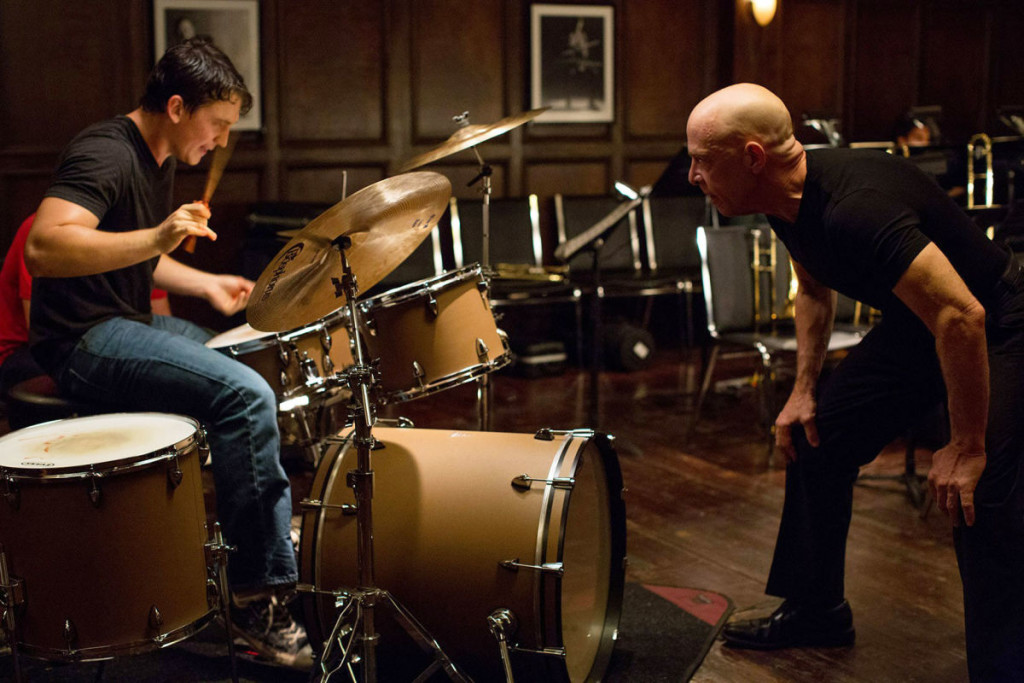Last updated on July 12, 2015
There are no two words in the English language more harmful than “good job”.
Man, what a movie!
Damien Chazelle’s Whiplash is a music movie. Yes, you probably know how this film ends in its pursuit of artistic perfection; the key to making a genre movie like this one work comes down to the tiny details in the fabric weaved on-screen. And boy, does Whiplash ever have a strange aesthetic! The story involves Andrew Neiman, a first year student at the Shaffer Conservatory in New York (for real-life purposes, think Julliard). He wants to become, no, will do anything to become, the best jazz drummer in the world. Lofty goals, perhaps, for a young guy who hasn’t hit the age of twenty yet, but not exactly impossible to a young mind. With a high school teacher father who, really, never did much of anything, Neiman feels a need to succeed beyond what other people tell him he will. The normal classes don’t cut it for him.
Enter Terence Fletcher. Notorious at the school for his unorthodox methods, he recruits Neiman for the Shaffer Conservatory big band. Andrew finds out firsthand the abusive, abrasive methodology of violent abuse and psychological games that Fletcher hopes will motivate his students to greatness. Sweet one moment and a horrible monster the next, J.K. Simmons absolutely deserves that Oscar for his performance as the music teacher from hell. What helps sell the role, even though we could call him a cartoon character of sorts, comes from his inscrutability. Does he really imagine that treating other human beings like this will help them succeed? Why does he switch from calm and collected to absolute madness at the turn of a dime? Does art require suffering, pain, and horrendous psychological damage to eke out results? Whiplash asks many questions, but (thankfully) does not justify the actions of its characters. Rather, we see a genuine striving for artistic greatness in the only way these two people know, a common dialectic of pain and torture rushing towards a vanishing point of insanity, destruction, or (finally) perfection. Either you stay in the realm of self-satisfaction, or you push through into the vein of personal improvement and hard work – here is one way to get here, Whiplash says, with no judgment either way.
Is any of this true of real jazz? Probably not. I imagine some of the stories (especially the one involving Charlie Parker and a cymbal thrown to decapitate him) probably wouldn’t stick on an official biography. Rather, they exist to show Fletcher’s character, and Neiman’s subsequent reactions to those moments. “Teaching” how to play jazz, for Fletcher, is not for personal enjoyment but greatness. What struck me most about this movie, contrary to other, similar films in its genre, was a total denial that school was the answer to this pursuit of musical achievement. The jazz greats, as you probably know, were mostly of African-American descent, probably had no formal education, and yet somehow resonate through the ages. Miles Davis, just for example, attended Julliard, but he left for greater success. As Wikipedia tells us:
In his autobiography, Davis criticized the Juilliard classes for centering too much on the classical European and “white” repertoire. However, he also acknowledged that, in addition to greatly improving his trumpet playing technique, Juilliard helped give him a grounding in music theory that would prove valuable in later years.
Even Terence Fletcher, oppressive dictator though he is, uses the school as a testing ground. Music, to him, does not exist as a fun game for rich white people who go to school in New York; he demands, and expects, greatness far beyond what most people can achieve. He knows how to elicit those results, even if the ends don’t justify the means. He must play the game, for he demands of himself the ability to produce one great jazz legend for the modern. Neiman, on the other hand, keeps right up with the pressure of playing drums at such an exacting and terrifying level. He demands greatness from himself, even at the expense of normal, human relationships. Both their ideals strive towards the same end, and neither of them clearly want it any other way. In other words, they don’t regret these decisions, or these games they play; rather, they relish in them, both finding themselves in a dance to “win the game”, and in the process hit the point of mastery. The pursuit continues beyond normal human institutions and into a personal obsession.
So yes, this movie has something to say, and takes a particular position, but it never panders down or says “this is why they pursue this goal”. The ideal remains intrinsic, not extrinsic, and so we can see both Andrew and Fletcher as genuine people. That doesn’t mean you must like them, but understanding them may prove the most important, interesting part of the entire film. The jazz, I think, is ancillary, and probably not exactly accurate to the art form; as a vehicle for interesting themes, though, it’s a great subject matter.
Now, I cannot actually recommend this film to every person. The R-rating exists as a wall to prevent all comers, and that’s no more true than in this film. Simmons uses a variety of colorful language, to put it in the nicest way possible, and almost all of it probably offends one people group or another. Without the absolute unwavering intensity, however, Whiplash wouldn’t quite give you the Whiplash of Hank Levy’s seminal big band song. It needed that level of intensity to create Terence Fletcher and not just remain a boring music motivational movie. If you can’t deal with racial and sexual slurs, among other salty language, this probably won’t work for you.
Still, if you can get past that, I would say you pretty much need to see this film. Go see it!

